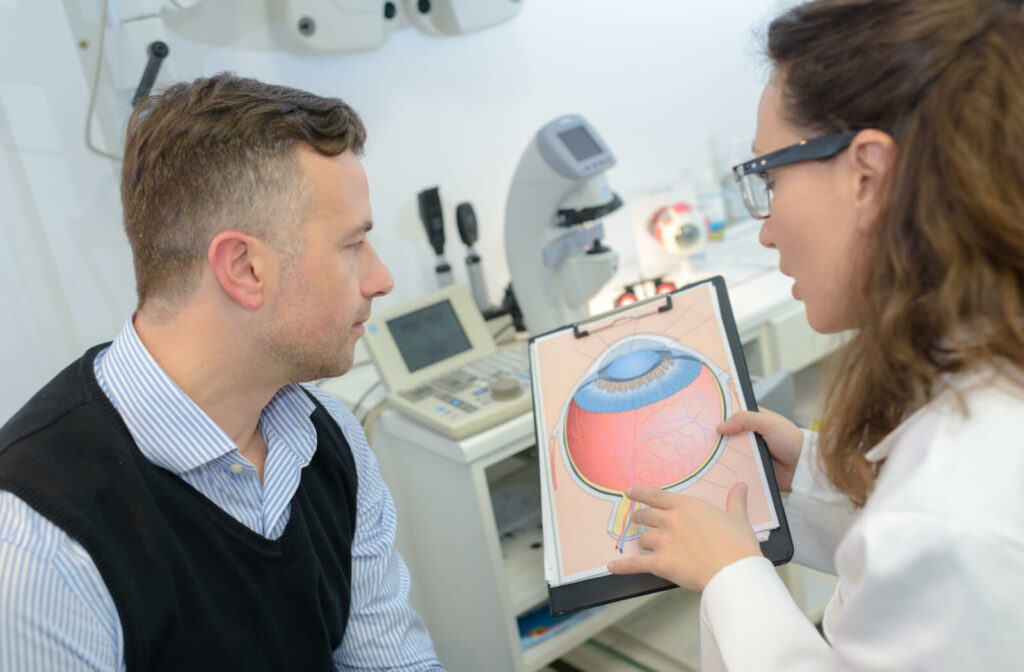Even if you can see clearly, you can develop eye problems. Family history can make you more at risk of eye diseases, making it essential to visit your optometrist regularly.
One common eye disease is glaucoma, but is this condition hereditary?
Glaucoma can be hereditary, depending on the type. The most common form of glaucoma, primary open-angle glaucoma, can run in the family.
Check Your Family History
You’re 4 to 9 times more likely to develop this disease if your immediate family has open-angle glaucoma.
While your family having glaucoma doesn’t mean you’re guaranteed to develop it, you should be cautious with your vision. Visiting your eye doctor for regular eye exams can help identify potential problems as early as possible.
Be Aware of Other Glaucoma Risks
Family history isn’t the only risk related to glaucoma. Other factors can affect glaucoma development, including:
- Genetics
- Age
- Family history
- Previous eye injury
- Hypertension
- High myopia
- Steroid use
- Central corneal thickness
How Can Glaucoma Affect Your Vision?
Glaucoma is a group of eye diseases that damage your optic nerve, an essential part of your eye responsible for your vision. It’s one of the leading causes of vision loss for Canadians over 60.
If this disease is left untreated, glaucoma can lead to severe vision loss. However, glaucoma can be difficult to notice because it typically develops with limited symptoms.
The later stages of glaucoma can cause:
- Blind spots in your peripheral vision
- Tunnel vision
Many but not all forms of glaucoma occur due to increased intraocular pressure (IOP), which causes damage to the optic nerve. The best way to protect your vision is to schedule frequent eye exams—your eye doctor can help diagnose and manage this disease.
What Causes Glaucoma?
Increased eye pressure and glaucoma have a distinct relationship. While experts aren’t 100% sure what causes glaucoma, many believe that increased IOP can damage the optic nerve, leading to vision loss. Eye pressure increases because the fluid in the eye cannot drain correctly.
It’s important to note that not all forms of glaucoma lead to increased IOP.

Types of Glaucoma
There are several types of glaucoma, each affecting the eye differently. Some conditions develop gradually, while others can be a potential eye emergency.
The common forms of glaucoma include:
- Open-angle glaucoma
- Angle-closure glaucoma
- Normal-tension glaucoma
Primary Open-Angle Glaucoma
Primary open-angle glaucoma is the most common form, occurring when fluid can’t drain out of the eye correctly. The drainage canal where the fluid leaves the eye is clear, but problems occur deeper in the drainage canals.
This form of glaucoma tends to have limited symptoms, making it difficult to diagnose. Your eye doctor can identify early signs of this disease during your comprehensive eye exam. If treated soon enough, you can protect your vision.
Angle-Closure Glaucoma
Angle-closure glaucoma occurs when your iris is not as wide or open as it should be, causing a blockage in your drainage canal. Fluid builds in the eye because of this blockage, increasing your IOP.
Angle-closure glaucoma can damage your vision gradually or rapidly. When eye pressure quickly increases, it’s known as acute angle-closure glaucoma. Rapid pressure builds because the drainage angle in the eye is completely covered, causing several uncomfortable symptoms.
Acute angle-closure glaucoma can lead to vision loss quickly, making it essential to visit your eye doctor as soon as possible. Its symptoms include:
- Nausea and vomiting
- Blurred vision
- Severe headache
- Eye pain
- Halos around lights
- Eye redness
Normal-Tension Glaucoma
Normal-tension glaucoma happens when optic nerve damage and vision loss occur without increased eye pressure.
Experts aren’t sure why normal-tension glaucoma occurs, but some people are more at risk than others.
How Can You Treat Glaucoma?
While you can’t cure glaucoma, your eye doctor can help manage it. The treatment your optometrist recommends depends on the type of glaucoma you have.
Some potential treatments for glaucoma include:
- Medication to lower eye pressure
- Laser treatment to drain fluid from the eye
- Surgery to help drain fluid from the eye
Protect Your Vision
Eye diseases like glaucoma can place your vision at risk, gradually damaging your sight. However, you can manage this condition with help from your optometrist. Don’t leave your vision up to chance—protect your sight with regular eye exams.
Contact Zargar Eyecare if your family has a history of glaucoma.

